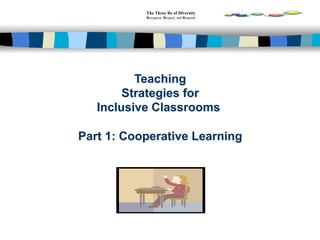
teaching-strategies1.pdf
- 1. Teaching Strategies for Inclusive Classrooms Part 1: Cooperative Learning The Three Rs of Diversity Recognise, Respect, and Respond
- 2. SE2000 “The Government’s aim is to achieve, over the next decade, a world class education system that provides learning opportunities of equal quality for all students.” (Policy p5) Special Education 2000: Evaluation and Monitoring
- 4. What is co-operative learning? “A set of teaching strategies in which students with differing skills and achievement levels learn together and take responsibility for both individual and group achievement.” John Medcalf, 1995 Medcalf, J. (1995). Cooperative learning and peer tutoring: Strategies for inclusive education. Reading Forum, 2, 11-19.
- 5. Types of learning environment ■ Competitive “I swim, you sink. You swim, I sink” ■ Individualistic “We are each in this alone” ■ Co-operative “We sink or swim together”
- 6. Co-operative learning background ■ Pioneered by Roger and David Johnson – US in 1970s ■ Used extensively all levels education system ■ Large body of research investigating efficacy – predominantly positive results
- 7. Rationale ■ Co-operative group work accommodates different needs and values individuals’ differences ■ Directly fosters 2/8 essential Skills in NZ curriculum – Social and co-operation skills – Communication skills
- 8. Rationale continued ... ■ Inclusive strategy -– everyone in class a member of a group and everybody participates in some way ■ Increases overall student involvement, ‘on-task’ rate ■ Fosters teamwork and teaches ‘working together’ skills. Teamwork an important life skill eg, parenting, workplace ‘teams’
- 9. Comparison with traditional group work Traditional groups homogeneous 1 leader indiv’s own resources no interdependence group functioning not important no reflection Co-operative groups heterogeneous leadership shared resources shared group interdependence group functioning important reflection important
- 10. Five basic principles – Johnson and Johnson ■ Positive interdependence P ■ Individual accountability I ■ Group reflections G ■ Small group skills S ■ Face-to-face interaction F
- 11. Positive interdependence ■ Learning activity structured so that group cannot succeed without each member participating / succeeding ■ Established through, for example: – group goal – group reward – shared materials/resources – assigned roles in group
- 12. Face-to-face interaction ■ Students interact over shared learning activity ■ Everyone included ■ Active participation encouraged by: – way in which activities are structured – way in which skills (for example, asking questions, giving or receiving explanations) are taught and monitored
- 13. Individual accountability ■ Every member of group accountable for learning the material and/or understanding task and helping others to learn and/or understand too ■ Established by, for example: – randomly selecting one member to report back – assessing individuals following group work – everyone a specific role
- 14. Small group skills ■ Training in how to work well together, how to collaborate ■ Teach specific skills, for example: – moving into groups – listening to others – encouraging others – resolving conflicts
- 15. Group reflection ■ Reflecting on how well group is functioning achieving goals, working together ■ Achieved by, for example: – group debriefing at end of activity – group rating quality of work/use of skills – teacher observing and giving feedback – student observers giving feedback
- 16. Role of teacher ■ Set objectives for lesson – task and skills ■ Assign students to groups ■ Explain the task – what want group to achieve ■ Explain how group to work together, for example, specific roles, sharing of one resource ■ Help groups with task and working together ■ Evaluate students’ learning and co-operation
- 17. Composition of groups ■ Teacher selected groups – ensure balance, inclusion and productivity ■ Group should be no more than 4 ■ Can form groups around target students with supportive peers ■ Change groups periodically but not too frequently
- 18. Roles in groups ■ Participation encourager ■ Materials manager / gopher ■ Organiser ■ Recorder ■ Reader ■ Speaker ■ Observer etc
- 19. Co-operative skills ■ Need to be – taught – practised – monitored ■ Hierarchy of skills – Johnson and Johnson 4 Fs
- 20. Co-operative skills continued ... ■ Forming – moving without noise – staying within the group ■ Functioning – asking for help – expressing support
- 21. Co-operative skills continued ... ■ Formulating – summarising – seeking elaboration ■ Fermenting – criticising ideas, not people – solving conflicts
- 22. Flexible formats ■ Co-operative activities can be brief, interspersed within lesson – Think – Pair – Share ■ Whole lesson – group sharing and recording of prior knowledge on new unit ■ Across lessons – project teams for duration of unit
- 23. Example ■ Inside / Outside Circle – two circles facing each other, talk in pairs, rotate one circle ■ Can be used as a structure for – introductions, class building – personal news, sharing experiences – reviewing work (questions on cards or teacher calls out)
- 24. Example ■ Three-step interview – groups of four, 2 pairs. Individuals in pairs interview each other, four students share information in round robin ■ Can be used as structure for: – sharing opinions – establishing prior knowledge re topic – reviewing learning etc
- 25. Co-operative learning – outcomes for students ■ Enhances academic learning ■ Fosters active problem solving, use of higher level thinking skills ■ Increases self-esteem ■ Improves ability to view situations from others’ perspectives ■ Improves motivation / attitude to work / school
- 26. Outcomes ■ Increases on-task behaviour, decreases off-task behaviour ■ Teaches skills and attitudes necessary to work effectively with others ■ Fosters more positive, supportive relationships between peers